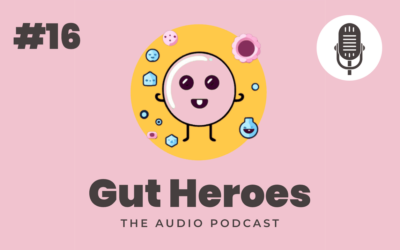This is a full transcript of Podcast Episode #16: World Health Organisation Releases Scathing Report On The Impact Of Ultra Processed Foods. You can listen to the audio version here.
Today I want to talk about an exciting new report that was released by the World Health Organisation just a few days ago.
It’s a call to arms and a much-needed expose of the health crisis we are facing.
The report identifies four industries: tobacco, ultra-processed foods, fossil fuels and alcohol as causing 2.7 million deaths a year in Europe, in the World Health Organisation region, and a whopping 19 million deaths a year globally.
That’s 34% of deaths they predict being down to these four industries.
We all know that smoking is incredibly bad in terms of health outcomes. We also know this about alcohol and fossil fuels. It’s the work on ultra-processed foods that I find particularly interesting.
They look at how global corporations have consolidated power.
To quote the report, “they wield significant power over the political and legal contexts in which they operate and obstruct public interest regulations which could impact their profit margins.”
It goes on to say, “these industries use an industry playbook of deceptive tactics designed to influence entire systems – health, political, economic and media – for their own interests, leading to significant health and social harm.”
They’re almost talking about these big food producers, tobacco companies, fossil fuel and alcohol producers as if they are a cartel.
They’ve amassed so much money that they’re able to operate within every strata of society, from the legal system to marketing, so that they’ve become almost all-powerful.
To quote some of the examples from the report:
“They delay, deter and block policies such as mandatory health and nutrition labelling for food and alcohol products.”
This is something I’ve talked about before on Gut Heroes.
Perhaps the best way to help reduce the harm of ultra-processed foods is to go straight to the labels. We’ve done this successfully with things like tobacco.
They have big labels on packets of cigarettes, for example, with an image or a big phrase, which outlines some of the health dangers.
In many countries, they also have them behind cabinets.
We know that this, as well as higher taxation on tobacco products, has had a strong effect.
Almost no one would argue that it is wrong to do this if you are putting the truth on these packets.
If labels explain that this could be harmful for your health because of X, Y, Z.
It’s very hard to argue against this because you’re just giving people information.
It’s information that they need to know, and it’s currently information that has been hidden by these food producers.
Obviously, the goal of any company is to sell as much of their product as possible.
To do that, they might use colourful packets with a cute cartoon animal, or a claim about giving you added vitamins.
In many cases this nonsensical because the quality of the product is so bad that any small benefit you might get, for example, from an added vitamin, would just be discounted many times over by the harmful effects that so many of their ingredients contain.
Another quote from the report is about industry tactics and “political lobbying and spreading misinformation and disinformation in the media.”
That’s a big one. To go back to the tobacco example, we saw this in the 50s and 60s where these really powerful deep pocketed companies would fund nonsense research and pay off doctors to say how healthy smoking can be.
Part of it is to mislabel reality to keep selling as much as possible.
The other part is a type of filibuster and delaying, I hope, the inevitable that one day this stuff will be looked back on with abject horror.
The idea that ourselves and our kids are being force-fed terrible food by these companies is horrendous.
Foods which are often making us sick, causing mental health problems and causing addiction to low quality, low nutrition foods.
This can have terrible downstream consequences in terms of health and in the future we will be horrified that we our governments didn’t clamp down on this sooner.
Another quote from the report mentions, “one of the tactics is to use harmful financial practices and targeted marketing strategies directed at children and young people.”
This is the idea that they are trying to indoctrinate humans from birth, with adverts of deliriously happy looking families and children eating food that won’t help nourish, grow, keep them healthy, strong and able to hold attention. All of these things can affect child wellbeing.
Often this hurts the people in society who are most vulnerable.
At the moment food producers have no disincentive to put out exciting or misleading marketing that targets people with lower food budgets.
They’re able to pump out ‘foods’ that they can charge an incredibly low price for, often because they’re super cheap to produce – and are sometimes even subsidised.
These foods have way too much shelf space and can suggest wonderful outcomes while often making people sick.
Another quote in terms of the tactics used, is that “they are promoting personal responsibility narratives that blame individuals for health problems.”
This is a particularly nasty and insipid one.
It’s basically saying, “well, if people are getting sick, it’s the individuals at fault. They should have more willpower… or they should be doing more exercise.” That’s a big one that is often pushed.
They claim that they’re just providing a product that’s tasty and it’s up to people to show restraint and to join a gym or whatever and it’s nothing to do with them.
This is an insane way framing this.
Let’s stick with the example of cigarettes again…
Imagine if newsagents were allowed to dedicate 80% of their store space to cigarettes with really cute cartoon characters on the packets, or pictures of celebrities puffing away.
Imagine this bombarded people when they entered a shop and they were almost solely exposed to things that were bad for their health.
Imagine the labels painted a false nirvana-like scenario where these products are actually good for them.
Hardcore marketing that’s misleading and spams people as soon as they enter a shop, immediately contradicts that idea of personal responsibility.
It infiltrates mindsets with misleading information.
It floods people with all the sticky, addictive traits of ultra processed food. It minimises the harms and even suggests that they could be healthy.
If people are bombarded with this false narrative they will likely make the decision to buy it because it’s convenient, it’s cheap and it sounds like it’s great.
Why wouldn’t they? You can’t blame personal responsibility for that.
The report goes on to talk about the consequences of this and says, “Failure to regulate industry’s harmful practices has allowed commercial power and influence to grow while public wealth and power have declined, perpetuating industry-driven health harms and especially the burden of NCDs, which accounts for 90% of deaths in the European Region.” That’s NCDs – non-communicable diseases, or diseases that you can’t catch.
This is where it really is a call to arms.
The WHO are saying, we’ve allowed this monster to grow and now we can’t control it and it’s decimating people’s lives.
I don’t think there’s any merit in calling out any particular individual who works for ultra-processed food companys.
People work hard and have to make a living and are usually cogs in a much bigger picture.
Someone might be working at one of these producers and doing a fantastic job of making the food taste great. This is objectively is a laudable thing and they would no doubt feel proud of that.
The problem is these companies are made up of thousands of people and the overriding drive and goal is to make money, that abstract driving force.
The profit machine is divorced from human empathy or what’s good for humans. So you have this big monolithic machine which is driving towards cost cutting and higher profits.
The individuals within the organisation are in many cases acting in good faith and doing a good job as an individual part of this machinery, but there isn’t this ability to step back and look at what actually is going on and take stock that this thing we are creating is killing people, is making people’s lives miseries.
That’s where we need the World Health Organisation and governments to seriously look at this and to help create strict laws and guidance to make sure this can’t happen.
We have monopolies commissions, which could be stronger, that look at companies becoming so powerful and big that they stifle the competition.
A good example of this would be a software company, swallowing up competitors.
Many years ago Microsoft came up against the Monopolies Commission because it was deemed that their software had become so ubiquitous (after all it was literally already installed on every single machine or PC computer).
When Microsoft would buy a new business or develop a new thing there would be a debate about monopoly. Have they become too powerful? Are they starving the competition?
That’s what we need to look at doing with food producers.
We need to shift the benefits and subsidies over to the natural, healthy producers.
Farmers who are growing healthy crops and farming animals in a humane way.
We need to make those the attractive options. That’s what we should be presented with when we go into a shop. Things that are going to taste great AND that are good for us.
Ultra-processed foods should be relegated to much smaller areas and presented as rare treats.
And they need to be labelled. Labels should highlight honestly and dispassionately what’s in the foods.
These giant food producers will be absolutely fine. They will pivot when they are given new guidelines.
They have very deep pockets and if they are suddenly told “you can’t feed people food that’s going to make them sick”, then they will flip things around.
They will start to produce food that is healthier… they’ll use those enormous marketing budgets to promote that food.
This isn’t about destroying businesses, harming jobs or even really pointing blame at individuals.
This is about doing what humans do best when we come together, identify a problem or challenge, and work to make a structure to avoid the most negative impacts and to encourage the positive impacts.
I’m really pleased that this report came out.
Some of the proposed solutions that the report talked about were that governments must address commercial influence at all levels, including, “individual, environmental, public policy and political economic systems.”
Specific recommendations included “regulations on marketing of health-harming products, monopolistic practices, transparency, lobbying, funding and conflicts of interest, taxation of multinational corporations, job security and labour conditions, exploitation of vulnerable populations during crises, and funding and support for civil society organizations to ensure their independence.”
That last point is really interesting and I’m sure we’ve all heard of the horror stories. For example, in places like India where a massive food producer promoted powdered milk and suggesting it was healthier than breast milk.
All this powdered milk almost being given away for free at one point, then it was very low priced.
People were trained into using it and told it was the healthier option until they became dependent.
It was like a drug dealer giving out free samples, then as soon as the victim was addicted, making them pay full price.
It is absolutely appalling because downstream of that many of those poor children will have had health problems for the rest of their lives.
This is the same argument we’re having with ultra-processed foods.
They talk about “prioritising public health in trade agreements” which I think is important.
“Stronger health-orientated interpretations of economic laws to ensure public health does not continue to lose out to narrow, outdated economic measures.”
There are a couple of examples of methods that have been applied in other countries, which we can learn from.
One of them is from Estonia. They formed a health coalition to help advance attacks on sugar-sweetened beverages and they did this despite industry opposition.
Despite massive food producers and drinks producers lobbying and using all of their marketing to try and block it. They just said, “no, enough is enough”. They got it through and it’s working.
Another example, Slovenia. They used national and international mobilisation of civil society organisations to help ensure passage of tobacco control legislation.
Obviously that’s focussed on tobacco, but it’s a good parallel example that we can use because it’s something that has now long been acknowledged as something we need to help people with. It gives us a very good example of where we can go with things like ultra-processed foods.
The report finishes up with an urgent call to action.
“We clearly see how big industry behaviour adversely affects public health and creates unnecessary sickness and suffering. The range of case studies in our report shows the scale of industry interference happening now in our Region, and that our current mechanisms to prevent NCDs are entirely unfit for purpose.” That’s Dr. Gowden Galea from the World Health Organisation.
Then another quote, “It will require all our efforts – Member States, civil society, academia and international organisations – to shield public policy and to protect future generations from preventable chronic diseases.”
A lot of what I talk about here on Gut Heroes is about chronic disease and debilitating long term conditions.
A big part of this, I believe, is the food we eat.
We’ve got to have an honest debate about this.
It will take every element of our society to figure out. The schooling system, the government, international organisations – it needs to be a collective effort.
The sooner we can figure this out – and we already have the resources and the ability to do this – the sooner we can make a massive change and stop this explosion of chronic illnesses, cardiovascular issues and other life-shortening conditions.



0 Comments